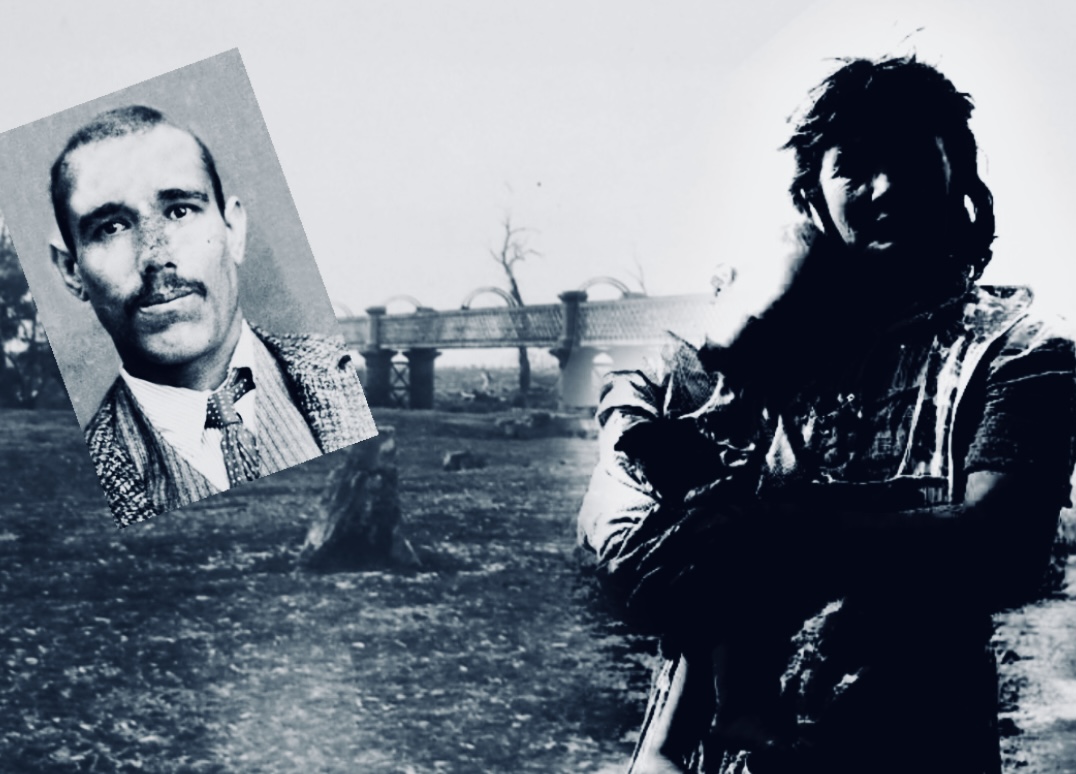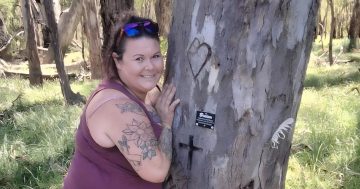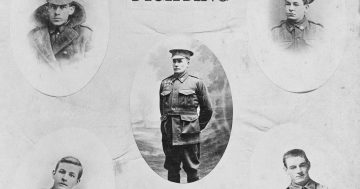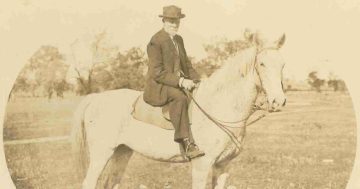
James Gates (left) lived in a bag tent with his impoverished family on the Wagga viaduct riverbank in 1919. Photo: Composite, Chris Roe.
Agnes Gates was a destitute widow with four children when she began squatting in a condemned house in Wagga near the Esplanade.
When complaints began to mount about her “immoral business” and her children’s begging, vagrancy laws targeting the poor and homeless were used to remove the impoverished family.
With the plight of Wagga’s rough sleepers recently in the spotlight, Wagga Wagga and District Historical Society president Geoff Burch was prompted to rewind the clock to the beginning of the last century to remember this woman and her family.
“The publicity for the plight of people living at Wilks Park reminded me of a story from 1921, which showed how society persecutes people in need rather than helps them,” Geoff wrote on the Society’s Facebook page.
Here’s a glimpse into the troubled life of Agnes Gates.
Born in 1879, Agnes Jane McGrath married James William Gates in Boorowa in 1898 and the couple had seven children.
James had his first run-in with the law at age 24 when he and a mate broke into the Bank of NSW at Burrowa and stole a cashbox containing about £40.
James Gates served 12 months for this offence but it would not be his last brush with police.
Tragedy struck the family at Burrowa in 1904 when Agnes and James’ six-year-old daughter Elizabeth entered a yard behind a store and passed too near a burning fire.
Agnes heard the screams and rushed to the yard to find her child alight.
She tore off the burning clothes and carried her home, but the burns were extensive and Elizabeth would not survive.
Two more children would pass away over the next decade.
In 1906 James was back behind bars after stealing rabbit skins and again in 1907 when he was convicted of attempted robbery.
Alcohol had him in its grip by 1914 and there were ongoing encounters with police and the courts.
By 1919, the family lived in a “bag tent” on the river bank near the viaduct bridge in Wagga. James picked up gardening work and did odd jobs around town.
His short and troubled life came to an end in May of 1919 when he contracted the Spanish Flu and passed away at the Wagga Wagga Hospital.
Agnes and her four surviving children were left to fend for themselves.
A request for State aid was rejected and the family left the river and began squatting in a condemned house near The Esplanade.
Agnes and her teenage daughter Josephine were suspected of “conducting immoral business” and Josephine soon gave birth to an illegitimate child.
They were well known to the police who cautioned them against the lives they were leading and responded to numerous complaints from the public about the children begging “from house to house”.
For a time, officers had turned a blind eye because of the family’s impoverished situation, but as complaints increased the decision was made to remove the house’s roof to make it uninhabitable and drive them out.
In 1835, the Colony of NSW had passed laws that allowed authorities to imprison sex workers, alcoholics, the unemployed and “whites” who associated with Aboriginal people under the heading “An Act For The Prevention of Vagrancy and for the Punishment of Idle and Disorderly Persons, Rogues and Vagabonds”.
The title was updated in 1902 to “An Act to Consolidate the Acts for the Prevention of Vagrancy” essentially ensuring that it remained a crime to be unemployed and homeless.
In Wagga on 9 February 1921, just days after Agnes and her impoverished family had been displaced, police raided a residence on the corner of Travers and Trail Street belonging to Chinese man Willie Wing Sing.
Agnes and Josephine, her son William Gates (aged 21) and an associate William Graham were arrested and charged with “being idle and disorderly persons”.
Two children, nine-year-old Hannah and thirteen-year-old Kitty were charged with being neglected.
Inside the small brick cottage with its dilapidated verandah and dingy rooms, police found no food except for a half-loaf of bread.
Agnes and her two girls had slept in a room at one end of the verandah, while Josephine and her child slept in a room at the other end of the verandah, under the window of “the Chinaman’s” bedroom.
The beds were described as “very dirty” and “composed for the most part of sacking and old bits of cloth”.
The two women were convicted and sentenced to a month’s imprisonment at Long Bay jail, with the option for a suspended sentence provided they entered into a good behaviour bond at £5 each.
The two men were convicted and sentenced to three months in Albury Gaol. They too had the option to enter into a good behaviour bond at £10 each plus a surety of £10.
The two children were made wards of the state and sent to an institution.
You can read more of Geoff’s research here.
















